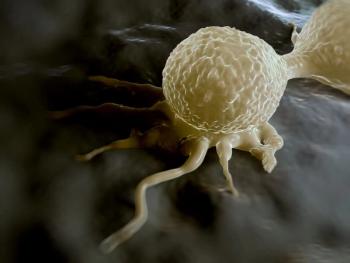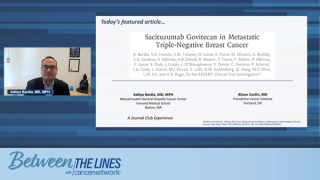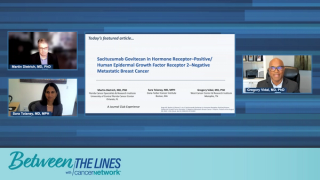
Breast Cancer
Latest News
Latest Videos

CME Content
More News

Findings suggest that sensitive circulating tumor DNA analysis may be a valuable tool for guiding neoadjuvant treatment decision-making in early-stage triple-negative breast cancer.

Data from a study highlight that the breast cancer makes up the highest number of early-onset disease cases compared with other cancer types from 2010 to 2019, although overall cancer morality appears to have decreased.

Paolo Tarantino, MD, discusses how drug prices within the United States are affecting the treatment of breast cancer.

In this September edition of Snap Recap, we share our highlights from Prostate Cancer Awareness Month, news in the breast cancer space, and the latest FDA updates.

A comprehensive overview of the treatment landscape in early-stage breast cancer, with a focus on CDK4/6 and PARP inhibitors.

Sara M. Tolaney, MD, MPH, discusses the evolving role of Ki-67 and circulating tumor DNA as prognostic or predictive biomarkers in breast cancer.

Data from the FABREC trial support the use of hypofractionated postmastectomy radiotherapy in patients with breast cancer following implant-based reconstruction.

Expert insights on biomarker testing in breast cancer, with a focus on key markers associated with specific subtypes.

Sara M. Tolaney, MD, MPH, an expert breast oncologist, reviews the overall treatment landscape for breast cancer.

The safety and tolerability of IDE161 is being assessed as part of a phase 1 trial in solid malignancies including breast cancer.

Monique Gary, DO, MSc, FACS, discusses emerging data on early-onset cancers, including breast cancer which had the highest incidence in this population.

A health-related quality of life analysis of the phase 3 NATALEE trial supports the risk/benefit profile of adding ribociclib to nonsteroidal aromatase inhibitors in patients with hormone receptor–positive, HER2-negative early breast cancer.

The regulatory decision to approve elacestrant in European patients with estrogen receptor–positive, HER2-negative locally advanced or metastatic breast cancer and an activating ESR1 mutation was based on data from the phase 3 EMERALD study.

Responses in patients with hormone receptor–positive, HER2-mutated breast cancer who crossed over to receive neratinib plus fulvestrant and trastuzumab support the necessity of neratinib in the triplet regimen.

The August CancerNetwork Snap Recap takes a look back at key FDA news updates, as well as expert perspectives on the chemotherapy shortage.

A planned phase 1 trial will examine CDK12/13 inhibitor CT7439 in patients with several types of solid tumors, including breast and ovarian cancer, as well as Ewing’s sarcoma.

Despite seeming to elicit more pathological complete responses in patients with hormone receptor–positive, HER2-negative triple-negative breast cancer receiving neoadjuvant chemotherapy, diet and exercise did not affect relative dose intensity.

Ann H. Partridge, MD, MPH, talks about how fertility preservation can positively impact the psychosocial health in patients with breast cancer.

Findings from the LUMINA study indicate that it may be feasible to omit radiotherapy in patients 55 years and over with T1N0, grade 1/2 luminal A breast cancer.

Updated findings from the phase 3 TROPiCS-02 trial support sacituzumab govitecan as a standard treatment for hormone receptor–positive, HER2-negative breast cancer, according to Sara Tolaney, MD, MPH.

When combined with brain stereotactic radiosurgery, trastuzumab emtansine appears to produce minimal acute skin effects among patients with non-metastatic breast cancer.

Data indicate that it may be safe to pause endocrine therapy for patients to attempt to conceive, and experts in the space review how it has impacted treatment strategies.

Investigators also report that disease-free survival was not associated with regional node irradiation treatment in favorable-risk, node-positive breast cancer.

Implementation of a personalized, proactive care pathway for breast cancer survivors will be evaluated in future clinical trials, according to one of the authors of a pilot implementation study.

Continuing multidisciplinary discussions during the chemotherapy shortage is important for delivering the best possible care for each patient with breast cancer, according to Maryam Lustberg, MD, MPH.










































